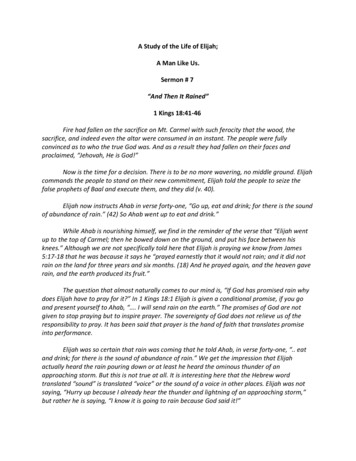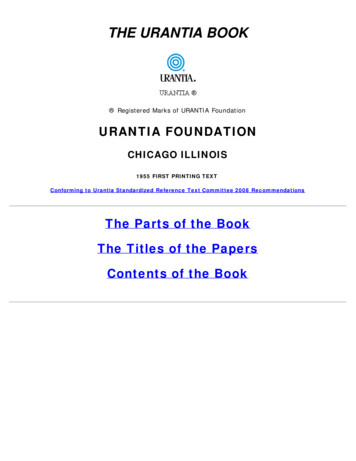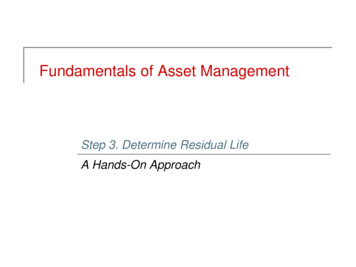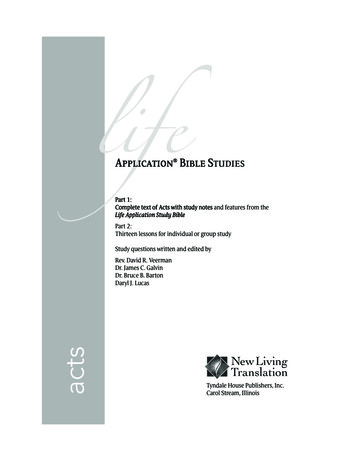
Transcription
A Study of the Life of Elijah;A Man Like Us.Sermon # 7“And Then It Rained”1 Kings 18:41-46Fire had fallen on the sacrifice on Mt. Carmel with such ferocity that the wood, thesacrifice, and indeed even the altar were consumed in an instant. The people were fullyconvinced as to who the true God was. And as a result they had fallen on their faces andproclaimed, “Jehovah, He is God!”Now is the time for a decision. There is to be no more wavering, no middle ground. Elijahcommands the people to stand on their new commitment, Elijah told the people to seize thefalse prophets of Baal and execute them, and they did (v. 40).Elijah now instructs Ahab in verse forty-one, “Go up, eat and drink; for there is the soundof abundance of rain.” (42) So Ahab went up to eat and drink.”While Ahab is nourishing himself, we find in the reminder of the verse that “Elijah wentup to the top of Carmel; then he bowed down on the ground, and put his face between hisknees.” Although we are not specifically told here that Elijah is praying we know from James5:17-18 that he was because it says he “prayed earnestly that it would not rain; and it did notrain on the land for three years and six months. (18) And he prayed again, and the heaven gaverain, and the earth produced its fruit.”The question that almost naturally comes to our mind is, “If God has promised rain whydoes Elijah have to pray for it?” In 1 Kings 18:1 Elijah is given a conditional promise, if you goand present yourself to Ahab, “ . I will send rain on the earth.” The promises of God are notgiven to stop praying but to inspire prayer. The sovereignty of God does not relieve us of theresponsibility to pray. It has been said that prayer is the hand of faith that translates promiseinto performance.Elijah was so certain that rain was coming that he told Ahab, in verse forty-one, “. eatand drink; for there is the sound of abundance of rain.” We get the impression that Elijahactually heard the rain pouring down or at least he heard the ominous thunder of anapproaching storm. But this is not true at all. It is interesting here that the Hebrew wordtranslated “sound” is translated “voice” or the sound of a voice in other places. Elijah was notsaying, “Hurry up because I already hear the thunder and lightning of an approaching storm,”but rather he is saying, “I know it is going to rain because God said it!”
Prayer is so much a part of Elijah’s life that when James, brother of our Lord Jesus,wanted an example of the value of “effective, fervent prayer of a righteous man” it was toElijah’s life that he points. (James 5:16) It was mentioned that Elijah prayed to begin thedrought (1 Ki 17:1). Later he offered a simple prayer for the recovery of the widow’s son inZarephath (1 Ki 17:20-22). On Mt. Carmel he offered a simple yet bold prayer for Jehovah toshow himself as the true God by sending fire (1 Ki 18:36-37). Even in his time of deep depressionhe cries out the to Lord under the Juniper tree – the only prayer God did not grant. Virtuallyevery time we see Elijah he is praying.Since he is such a good example of powerful prayer, I want to take a few moments andexamine what we can learn about prayer. Note with me four components of Elijah’s prayer.1. He humbled himself (1 Peter 5:6)“Therefore humble yourselves under the mighty hand of God, that He may exalt you in duetime.”W. Phillip Keller says, “Before there could be any blessing from above, there had to be abrokenness before God Before there can be refreshing there must be repentance.” [W. PhilipKeller. Power: The Challenge of Elijah. U.K.: Bridge Pub., 1984) p. 93]The Psalmist reminds us that God delights to draw near to those who are of broken andcontrite spirit (Ps 51:17).Alone now except for his servant boy, perhaps the son of the widow from Zarephath, theboy whom he had raised from the dead, Elijah prostrated himself on the summit of Mt Carmel.Scripture does not give a single prescribed posture for prayer. There are examples in the Bible ofpeople praying while standing (Neh 9:5), kneeling (Ezra 9:5), sitting (1 Chron 17:6) bowing (Ex34:8) and with uplifted hands (1 Tim 2:8). What can be said of Elijah posture was that it gaveoutward evidence of his inward earnestness.He not only prayed humbly 2. He prayed specifically. Sometimes our prayers are so general that we would not know if theywere answered or not. Prayers like, “Lord bless all our missionaries.” Exactly how are you goingto know when that prayer has been answered? Definite specific prayers bring definite specificanswers. Elijah knew what he wanted, rain and that is what he asked for.There is a neat illustration is found in the book, Elijah, by Howard Hendricks:“We have a lovely family in our community. The father felt God was compelling him intovocational Christian work. So he sold his business at a loss and entered the work to which theLord had called him. And things got rather rough financially.
One night at family devotions, Timmy, the youngest of four boys, asked, “Daddy, do youthink Jesus would mind if I asked Him for a shirt?” “Of course not,” answered his dad. So theywrote in their little prayer-request book, “Shirt for Timmy.” Mom added, “Size seven.” You canbe sure that every night Timmy saw to it that they prayed for the shirt. For weeks they prayedfor it--every night.One day the mother received a telephone call from a Christian businessman, a clothier indowntown Dallas. He said, “I just completed our July clearance sale. Knowing that you have fourboys it occurred to me that I have something you might use. Could you use some boys’ shirts?”She said, “What size?” “Size seven.” “How many do you have?” He said, “I have twelve of them.”What would you do? Some parents would take the shirts and stuff them in the bureaudrawer and make some casual comment to the child. Not this enlightened family. That night, asexpected--“Don’t forget, Mommy, let’s pray for the shirt.” “We don’t have to pray for the shirt,Timmy. The Lord answered your prayer.” “He has?” “Right.” As previously arranged, brotherTommy goes out, gets the shirt, brings it in, and puts it on the table. Timmy’s eyes are likesaucers. Tommy goes out, gets another shirt and brings it in. Out, back, out, back, until he haspiled twelve shirts on the table, and Timmy thinks God has gone into the shirt business. There isa boy today by the name of Timmy who believes that there is a God in heaven who is interestedenough in a boy’s needs to provide a shirt.” [Howard G. Hendricks, Elijah, Confrontation, Conflict& Crisis, (Chicago: Moody Press, 1972) pp. 46-47.]He not only prayed specifically 3. He prayed expectantly. (v. 43)“and said to his servant, “Go up now, look toward the sea.” So he went up and looked, and said,“There is nothing.” And seven times he said, “Go again.”When the boy initially saw no indication in the sky of a coming rain storm, the prophetsimply told him to keep looking – it would appear! When the servant returned again withoutsighting any indication of rain, Elijah told him to look again.When the boy returned the sixth time with the report that there was not a single sign onthe horizon of any change in the climate, one wonders if he Elijah did any soul searching. Did heask himself, “Was I too presumptuous in telling the king that the rain was on the way?” Butperhaps not, for Elijah’s faith did not rest in the clouds but in the God who promised.Circumstances could not dictate his faith. To Elijah the question was not “if” but only “when.”Elijah prayed expecting God to answer, In regard to prayer it is important to realize thatif you expect nothing you will seldom be disappointed. In Matt 7:7 Jesus told his disciples “Ask,and it will be given to you; seek, and you will find; knock, and it will be opened to you.” The verbtenses in this passage make this verse say, “Keep on asking, keep on seeking, keep on knocking.”
A story is told of George Mueller who was known for his powerful prayer life. In thecourse of his ministry to the orphans of England, he never once asked for financial assistancefrom men - only God. and he constantly received what was needed to the penny.“Once while on his way to speak in Quebec for a engagement. On the deck of the shipthat was to carry him to his destination, he informed the captain that he needed to be in Quebecby Saturday afternoon.As the captain related the story, he said "’It is impossible,’ I said. ’Do you know how densethis fog is?’" "’No,’ he replied, ’my eye is not on the density of the fog, but on the living God whocontrols every circumstance of life. I have never broken an engagement in 57 years; let us godown into the chart room and pray.’He knelt down and he prayed one of the most simple prayers. When he had finished Iwas going to pray, but he put his hand on my shoulder and told me not to pray. ’As you do notbelieve He will answer, and as I believe He has, there is no need for, you to pray about it.’George Mueller said, ’Captain, I have known my Lord for 57 yrs. and there has neverbeen a single day when I have failed to get an audience with the King. Get up, Captain, andopen the door and you will find that the fog has gone.’ "I got up and the fog indeed was gone,and on that Saturday afternoon George Mueller kept his promised engagement."Our God is not lacking in power the problem is that sometimes we pray without faith.This truth is illustrated in a somewhat humorous way in the Biblical record of Peter’s deliverancefrom prison. We find the story in Acts 12:5-16. In Acts 12:5 we read, “Peter was therefore kept inprison, but constant prayer was offered to God for him by the church.” When God miraculouslydelivered Peter in response to the prayers of the church, Peter makes his way to where theassembled believers are gathered still in prayer for his situation. When the young girl whoanswered Peters knock on the door, told the news to those who were praying they thought shewas crazy. Even when they saw him themselves they “they were astonished.” (Acts 12:16). Ifthey were praying in faith should they have been astonished. But then are we not just asastonished when our prayers are answered? Elijah, however, prayed with the full expectationthat his prayers would be answered.He not only prayer expectantly 4. He prayed persistently. (v. 44)“Then it came to pass the seventh time ”This third component of Elijah’s prayer is seen in Elijah persisting in his request “seventimes” until God answered. One thing we can know for sure, God’s timing is not based on ourclock. He is never late, but He often deliberately “delays.” Some times the test for us is that wemust wait to see God’s answer. We pray, and we want an answer fast – right now!
Why does God let his children wait like this? It cannot be that he has to be persuaded togrant our requests. Either the request is not at the right time or there is some benefit for us inletting us wait! Perhaps he wants to prove the sincerity of our request. But Elijah’s sincerity hasbeen evident from the first. Perhaps it is the matter of pride, in spite of how humble he mayappear the scripture tells us that he was a man “with a nature like ours.” (James 5:17) Waitingwould cause him to throw himself more completely upon Jehovah. We may believe thatwhatever the reason that each time he prayed and saw no results, that he prayed harder andwith more urgency.Until we read in verse forty-four, “Then it came to pass the seventh time, that he said,“There is a cloud, as small as a man’s hand, rising out of the sea!” So he said, “Go up, say toAhab, ‘Prepare your chariot, and go down before the rain stops you.’”Elijah’s prayer was answered not because how eloquent it was, not how long it was, norhow loud it was, it was effective because it was humble, specific, expectant and persistent.We will conclude tonight with just a word about the effect of Elijah’s prayer in verseforty-five. “Now it happened in the meantime that the sky became black with clouds and wind,and there was a heavy rain. So Ahab rode away and went to Jezreel.”The first effect is thatit rained. The rain that had been held up for over three and a half finally comes. The rain whichhad been withheld because of national sin is granted. When the nation acknowledged its sin,God responded with the blessing of rain.The second effect is upon Elijah himself for we read in verse forty-six, “Then the hand of theLORD came upon Elijah; and he girded up his loins and ran ahead of Ahab to the entrance ofJezreel.” Elijah actually outran the chariot of Ahab the entire eight miles to Jezreel. That is anachievement to make any marathon runner proud. After a long tiring day it was only possiblebecause God supplied special strength as indicated in the words, "the hand of the LORD cameupon Elijah.”
Prayer is so much a part of Elijahs life that when James, brother of our Lord Jesus, wanted an example of the value of "effective, fervent prayer of a righteous man it was to Elijahs life that he points. (James 5:16) It was mentioned that Elijah prayed to begin the drought (1 Ki 17:1).











